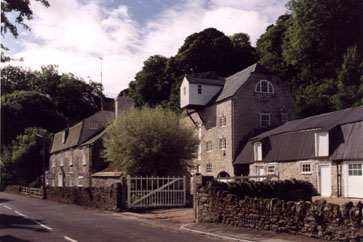

|
Edward, and Christian his wife, raised a family of six children in Upwey. They were Alice (1597), Ralph (1599), Edward (1601), Richard (1605), Christopher (1607) and William (1609). In the year 1614 Edward Sprague (senior) was still a relatively young man but he sickened and hastily arranged for his Will to be written. This was signed on the 6th June that year, shortly before he died as probate was granted on the 13th of that month. This Will still survives within the family in America and I have placed a transcription on the Upwey page as it includes an inventory of their possessions and names all his children. At the time of his demise Alice, the eldest, was 17, Ralph who was now technically head of the family was 15 and the youngest William only 5 years old. Their lack of maturity and Edward's death seems to have precipitated a number of changes.  Alice's marriage drew the two families together and on 15th August 1623 Ralph SPRAGUE also married in Fordington to Johane [Latin for Johanna or modern day Joan] WARREN. Ralph and Johane settled in Fordington and on 23rd May 1624 their son John SPRAGUE was baptised in St George's Church. Their mother Christian is also reputed to have remarried to a John CORBIN. I cannot locate the marriage but a letter survives dated 25th March 1651 in 'The New England Genealogical Register' in America from John Corbin of Upwey where it appears that he was Ralph's father in law. In any event Ralph's younger brothers Christopher & William also moved to Fordington to live and it was during this time that William really got to know his future wife Millicent EAMES, the daughter of the above mentioned Anthony. Unfortunately Christopher SPRAGUE soon sickened and died being buried in St George's graveyard on 31st May 1625(5). Ralph and Johanna quickly had a 2nd child, another boy, whom they called Jonathan SPRAGUE who was baptised there on 27th November 1625. Living in Fordington Ralph and his family were surrounded by influential puritans and Ralph is said to have become a close friend of the Rev John WHITE in Dorchester [See Pilgrims of Dorchester & Fordington for background]. Edward PELE another staunch puritan and the vicar of St Georges Church in Fordington had of course carried out his marriage to Joanna in 1623 & baptised his first two children, so its easy to see how he became involved in the movement to start a new life in New England. Ralph, Richard and William Sprague, together with John Endicott and others set sail from Weymouth on 20th June 1628 on board the ship Abagail. There is a commemorative plaque in Weymouth harbour to this affect which greets passengers as they disembark from ferries that land there. Ralph was due to appear before the Quarter Sessions at Blandford in answer to a summons and the hearings were held between 13th and 15th January 1628/9. We will never know what the summons was about but most likely a disputed debt or breach of one of the many onerous religious doctrines of the day. Unusually his is the only one of 41 people whose cases were dealt with that day where no plea was entered against his name; and the case appears to have been simply abandoned. Eight people are recorded as appearing in person to answer the summons that day, the rest appointed an attorney. In Ralph's case he had appointed William DERBYE (An investor in the Dorchester Company,) to act on his behalf so he would have represented him before the Court. As no further action was taken this can only be because he had already sailed to New England 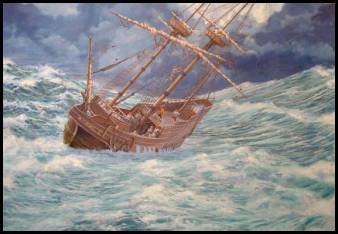 1620 Mayflower - 238 tons 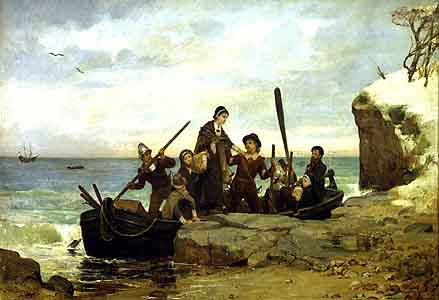 1. Ralph Sprague [1599-1650] ---In Upwey Dorset 1599-1622: In Fordington Dorset 1623-1628: In New England 1628-1650: 2. Johannah Sprague wife of Ralph nee Warren [1603-1679/80] --- In Fordington 1603-1628: Married Fordington 15 Aug 1623: In New England 1629-1679/80: died Woburn Middlesex Massachusetts: 3. John Sprague son [1624 - 1692] ---Bap Fordington 24 May 1624: In Fordington 1624-1628: In New England 1629-1693: died 25 Jun 1692 Malden Massachusetts: 4. Jonathan Sprague son [1625 - 1650] ---Bap Fordington 27 Nov 1625: In Fordington 1625-1628; In New England 1629-1650: died Dec 1650 Malden Middlesex Massachusetts: 5. Richard Sprague son [1627 - 1703] ---In Fordington 1627/8-1628: In New England 1629-1703: died 1703 Massachusetts] 6. Richard Sprague brother of Ralph & William [1605-1668]--- In Upwey Dorset 1605-1622; In Fordington 1623-1628; In New England 1628-1668: married but had no issue and died Charlestown Massachusetts + Wife 7. William Sprague brother of Ralph & Richard [1609-1675]---In Upwey Dorset 1609-1622: In Fordington 1623-1628: In New England 1628-1675: married Millicent Eames daughter of Anthony Eames from Fordington in New England 1635- died Hingham Massachusetts [Note:: I am not qualified to comment on research in America and it is only my intention to give an account of what happened to them after arrival in Massachusetts. I have scanned numerous accounts of their lives and tried to use only information that appears to have been based on provable fact and/or sound research. For example I have used the account given in Francis Higginson's Diary which was written at the time to describe the voyage of the Lyon's Whelp, The "Sprague Genealogy" written in 1833 by Hosea Sprague and the excellent "Sprague Project" Website for many of the facts surrounding their lives together with Frothingham's History of Charleston] 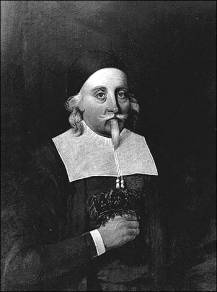
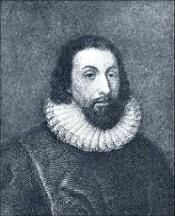 Their first months in Charlestown were spent in clearing lands, felling trees in order to build their homes so there had not been much time to plant crops and the icy blasts of winter came before they were totally prepared.
That winter of 1629/30 was particularly severe in a climate none of them had ever experienced before. They became short of provisions and suffered great hardships. It was thus that the Sprague brothers and others founded the beginnings of Charlestown, which developed in future years to include such places as Malden, Woburn, Stoneham, Hurlington, Somerville, a large part of Medford, a small part of Cambridge, West Cambridge, and Reading. The Charlestown of today however is not quite so extensive. In addition to building their own homes, a "Great House" had to be erected at the direction of Mr. Graves on the south eastern slope of the hill for Deputy Governor Winthrop and his associates who were due to arrive in 1630. The Great House was also to serve as a Meeting House for the first few years. [Note:- There is mention of a Thomas Walford Smith already living here when they arrived. Other names mentioned were John Meech; Simon Hoyte; Abraham Palmer; Walter Palmer; Nicholas Stower; John Stickline.]
Their first months in Charlestown were spent in clearing lands, felling trees in order to build their homes so there had not been much time to plant crops and the icy blasts of winter came before they were totally prepared.
That winter of 1629/30 was particularly severe in a climate none of them had ever experienced before. They became short of provisions and suffered great hardships. It was thus that the Sprague brothers and others founded the beginnings of Charlestown, which developed in future years to include such places as Malden, Woburn, Stoneham, Hurlington, Somerville, a large part of Medford, a small part of Cambridge, West Cambridge, and Reading. The Charlestown of today however is not quite so extensive. In addition to building their own homes, a "Great House" had to be erected at the direction of Mr. Graves on the south eastern slope of the hill for Deputy Governor Winthrop and his associates who were due to arrive in 1630. The Great House was also to serve as a Meeting House for the first few years. [Note:- There is mention of a Thomas Walford Smith already living here when they arrived. Other names mentioned were John Meech; Simon Hoyte; Abraham Palmer; Walter Palmer; Nicholas Stower; John Stickline.]<<<John Winthrop 1588-1649 2nd Governor Colony After this experience Charlestown felt compelled to organise and form of Militia to prevent any future incursions. When the Governor arrived later in 1630 he "found the Colony in a sad and unexpected condition. No less than eighty had died during the very cold winter and those that had survived could hardly procure the means of subsistence." Gradually the summer saw a general improvement. More Settlers arrived in New England and trade and cultivation of the lands soon began. However, the Puritan moral codes and strictures still dominated the scene. It is also recorded that in 1634 he was commissioned with two others to advocate certain interests of the town before the General Court, and the next year in May 1635 he was chosen Selectman, and continued in that position for some time. In 1635, the General Court granted him 100 acres of land "having borne great difficulties in the beginning." Their home stood in Crooked Lane, later called Bow Street near the Great House and what is now part of the City Square. During these years there were further additions to the family: Jabuz Sprague [1629 - 1651] Born Charlestown Massachusetts Ralph died on 24th November 1650 at Malden Middlesex County in Massachusetts and bequeathed his homestead and its farm to his sons John and Phineas, and his farm in Pond Feilde" to his sons Richard and Samuel. His home was located in what is now Mountain avenue. Joan remarried 2nd Sep 1662 to Edward Converse and died 24 February 1679/80 at Woburn, Middlesex Massachusetts leaving a will ("Middlesex County, Massachusetts, Probate Records," [MPR], Case #4930) which was proved 15 June 1680. Note:- I have only commented on children born in Fordington 1.1 John Sprague [1624 - 1692] - Baptised in Fordington Dorset England on 23 May 1624 he emigrated at the age of 5 and married in Malden Middlesex County Massachusetts on 2nd May 1651 to Lydia the daughter of Edward Goffe and Joyce Frost. Like John, she too had been born in England, and travelled to New England with her father arriving in 1635. 1.2 Jonathan Sprague [1624 - NK] - Jonathan was baptised in St Georges church Fordington England on 27th November 1625 and emigrated with the family in May 1629. Died Dec 1650 Malden Middlesex Massachusetts: 1. 3 Richard Sprague [1627/8 - 1703] Richard is said to have been born in England, although there is no trace of a baptism here in 1627 or 1628, the records for 1629 are missing. Some accounts of the family in Massachusetts say that he "came to America in his mother's arms" on the Lyon's Whelp in 1629 so its possible that he was born here late and baptised in Fordington in the first months of 1629. On 16th March 1680/81 as Capt. Richard Sprague he commanded the 2nd train-band of Charlestown. He joined the First Church in Charlestown in 1681 and became a Representative in the General Court for Charlestown that year and for several years later. He was also recruited as a member of the Artillery Company, and in 1683-4 became first sergeant. He marched with his company into Boston on the memorable 18th of April 1689, and assisted in the revolution against Edmund Andros. He was appointed to the "Council for the safety of the people and conservation of the peace." which was established for the provisional government of the colony; but when the convention of the colony subsequently chosen, besides taking temporary measures for the public safety, assumed to institute a new government without the sanction of the crown, he, with other leading citizens, protested and appealed to their majesties, William and Mary, believing the action of the convention unconstitutional and contrary to their oaths of allegiance. He was thereupon deprived of his captaincy, expelled from the House of Representatives for "his contemptuous carriage against the government," and was arranged before the court for "seditious libel." He was however, acquitted of the charge and was elected to represent the town in the General Court until his death. Picture is of "Andros a Prisoner in Boston" as depicted in "Pioneers in the Settlement of America" Richard made his will on 5th October 1703 and died within days as it was probated on the 18th of that month. He became a member of the Honorable Artillery Company in the year 1638, which company received its charter in that year and was composed of members of different towns in the colony. The General Court granted him one hundred acres of land in 1639 significantly adding as the reason of its vote "having borne difficulties in the beginning." He was made Second Sergeant of the Artillery Company in 1646/7 progressing to first Sergeant in 1652/3, Ensign 1659 and Lieutenant in 1665. For several years he was selectman, and from 1659-1666 he was deputy to General Court. He followed the sea, however, building a successful business as a merchant. On 14 Nov 1664 he was Captain of the pink "Consent," for Nevis and St. Christopher ['pink' was a term used to describe a small, flat-bottomed ship with a narrow stern]. He owned several vessels and was in trade with Barbados. He accumulated a large property by grant and purchase as his possessions showed; thirteen lots of real estate comprising many acres, wharf, warehouse, investments in vessels, etc. His Will is dated 15 Sep 1668 and apart from leaving property to his wife Mary gave to Harvard College 400 pounds, and thirty-one ewes and thirty lambs; to his brother William of Hingham his sword; to his nephew Richard, son of Ralph, his wharf and warehouse with other property. His estate was valued at 2357 pounds, 16 shillings, 8 pence. He died on 25th November 1668 . Mary died before16th June 1674 when her Will was probated. Soon after marrying, William made an exploratory trip to Bare Cove, later called Hingham. He landed on the east side of the cove, on ground that was afterwards legally granted to him by the town. He probably settled there in the summer or fall of 1636 and they raised 10 more children in Hingham. Many parcels of land and meadow (recorded in the "Old Grant Book) were given to him by the town, covering a period from 1636 to 1647. His house lot was said to have been the most pleasant in Hingham, and was situated about two miles north of the Patent Line which formerly divided the old Massachusetts Colony from the Plymouth Colony. These gifts indicate the esteem in which he was held by his fellow townsmen. On 30th January 1645, he was one of seven men chosen at a town meeting to order the prudential affairs of the town. In 1662, he was the disbursing officer for Hingham; also Constable, Fence viewer, etc. On 21st February 1673 he deeded his son, Anthony, certain land for £36 of lawful money of New England and £9 in merchantable corn. William died on 26th October 1675 and Millicent on 8th Feb 1696 both in Hingham and his Will is given below. In the Name of God, Amen. The nineteenth day of October, in the year of our Lord God, One thousand, six hundred, seventy & five. I, WILLIAM SPRAGUE, senior, of Hingham, in New England, being sick in body, but yet of perfect memory; praised by almighty God! do make and declare this my last will and testament, in manner and form following: Revoking, and by these presents, making void, and of no force, all and every will and wills heretofore by me made, and declared, either by word or writing, and this to be taken only, for my last will, and none other. FIRST and principally, I commit and commend my soul into the hands of Almighty God, and my body to the earth, to be decently buried, at the discretion of my executor hereafter mentioned, hoping of salvation, both of soul and body, by the mercies of God in the merits of my Saviour Jesus Christ. And as for such temporal estate as it hath pleased God to bestow upon me, I do order, give and dispose the same in manner and form as followeth -- that is to say: FIRST -- I will that all those just debts and duties that I owe in right and conscience to any person whatsoever, shall be well and truly contented and paid by my Executor hereafter named out of my Estate, with my funeral charges, which I will shall be first paid. Item -- I give and bequeath unto Millesaint Sprague, my loving wife, the sum of Ten pounds in money, and one Cow and one Horse. Item -- I give unto the said Millesaint, my wife, ten pounds per annum during the term of her natural life, (to be paid to her by my son, William Sprague, which I have reserved for her, as may fully appear by a deed of gift under my hand and seal to my said son, William, of my house and several lands and commons, as is therein expressed, ) and the summering and wintering of one cow and one horse, and the use of one half of my dwelling house, and half the orchard, according as I have reserved upon the said deed of gift. Item -- I give unto Millesaint, my said wife, thirty and five pounds which is due from me by my son, Anthony Sprague, to be paid five pounds a year till the whole be paid: that is to say, in case my said wife live till all the said payments be made to her: but if my wife decease, before all the said payments of thirty and five pounds be made, then my mind and will is, that what is remaining unpaid of the said thirty and five pounds at my wife's decease, shall be divided equally amongst all my children hereafter named, that is to say: my son Anthony Sprague, my son Samuel Sprague, my son William Sprague, my daughter, Perses Doggett, the wife of John Doggett, Joanna Church, the wife of Caleb Church and Mary King, the wife of Thomas King, every one of them to have part and part alike. Item -- I give unto Millesaint, my said wife, all my household stuff and furniture, linen, woolen, and utensils of household whatsoever, for and during the term of her natural lie; and after my wife's decease my mind and will is, that it shall be divided amongst all my aforesaid children, every one of them to have part and part alike. And all my cattle not before given to this my will, to be immediately after my decease, disposed of by my Executor, as followeth; that is to say: to my son William Sprague two steers three years old and the [?] and one cow; and all the rest of my cattle to be equally divided among the rest of my children aforenamed, every one of them to have part and part alike. Item -- I give and bequeath unto Anthony Sprague, my SWORD, which was my brother Richard Sprague's and one of my biggest pewter platters, and twenty shillings in money; which, with what I have given him before, in Land, and other things, and his part of my household stuff and cattle, after the decease of myself and my wife, as it is afore expressed, I judge a sufficient portion for him. Item -- I give unto my son John Sprague, a piece of salt marsh, lying at Lyford's liking river, in Hingham, containing two acres and a half, be it more or less, which was given me by the town of Hingham, to enjoy to him, and his heirs, and assigns forever. And I do give unto my son John Sprague my searge suit of apparel, which with a Neck of Upland, called Sprague's Island, lying by the aforesaid meadow which I formerly gave to him, I judge a sufficient portion for him. Item -- I give unto my son Samuel Sprague my cloth coat, which was my brother's and one of my biggest pewter platters. Item -- I give and bequeath unto my son Jonathan Sprague, threescore acres of Land, lying in the bounds of the township of Providence, in New England, which I lately purchased of John Dexter, of the said Providence which said threescore acres of land, I do give to my son Jonathan during the term of his natural life; and after his decease unto his heirs male, lawfully begotten of his body, lawfully begotten or to be begotten; and for want of such hairs, the said threescore acres of Land to return to the next heirs of the Spragues descended from me. Also, I give unto my said son Jonathan Sprague my best cloth suit of apparel. Item -- I give unto William Sprague one feather bed, which the used to lodge upon when he lived with me, and one on my biggest pewter platters. Item -- I do make and ordain Millesaint Sprague, my loving wife, my full and sole executrix of this my last will and testament. In witness whereof, I the said William Sprague have hereunto set my hand and seal, the day above written. WILLIAM SPRAGUE and a seal. DANIEL CUSHING, sen Genealogical Notes:- (1).The history of the First church, Charlestown: in nine lectures, with notes By William Ives Budington, also records the death of Captain Richard Sprague on 25 Nov 1668 at the age of sixty three, and bequeathed to the church property to the amount of £30. It also incorrectly refers to his son who bore the same title and died on 7th of October 1703 at the age of seventy eight and was the most munificent benefactor of this church having bequeathed to it a valuable parsonage houseand lands.(it was his nephew as he had no children; Richard Sprague was the son of his brother Ralph Sprague. (2). "The Memorial History of Boston, including Suffolk County, Massachusetts, 1630-1880, in four volumes". Page 565 Provides the text of the covenant:- " In the name of our Lord Jesus Christ, and in obediance to His Holy will and Divine ordnance:- Wee whose names are hereunder written, being by his most wise and good providence brought together into this part of America in the Bay of Massachusett, and desirous to unite ourselves into one Congregation, or Church, under the Lord Jesus Christ our Head, in such sort as becometh all those whom He hath Redeemed, and Sanctified to Himselfe, doe hereby solemly and religiously (as in his most holy presence)Promise and bind ourselves to walke in all our wayes according to the Rule of the Gospell, and in all sincere conformity to his Holy Ordinancesand in mutuall love and respect each to the other so neere as God shall give us grace". There follows a list of 164 names. Richard Sprage is the 79th name on the list on page 566 whilst Ralph and his wife Joan are the 103rd on page 567. (3). "The Memorial History of Boston, including Suffolk County, Massachusetts, 1630-1880, in four volumes". Page 384 states " Captain Richard Sprague was then living [1662 specimen signature shown] and from him without doubt, many of these statements were procured. Mr Everett in his address commemorative of the bi-centennial of the arrival of Winthrop at Charlestown, in speaking of the three vbrpthers, ralph, richard and William Sprague, saysthey were ' the founders of the settlement inn this place, ' and 'were persons of character, substance, and enterprise: excellent citizens: generous public benefactors: and the heads of a very large and respectable familoy of descendants'. They arrived in Salem, --in 1628 says the record, but probably 1629 is the actual date of their coming, -- and with three or four others journeyed through the woods 'the same summer' to a place situate and lying on the north side of Charles River, full of Indians called Aberigians---- (4) Sprague families in America (5) There is some reference to Christopher Sprague marrying Anne Grey before his death in 1625. This comes from The 1623 Visitation of Dorset for the family of Grey on page 48 where Anne Grey is shown as the daughter of Walter & Mary Grey of Bridport and Ux (i.e. abbreviation for the latin uxor or wife of ) Christopher Sprague of Turners Piddle (now Turners Puddle in Dorset - 9 miles east of Fordington on the river piddle). Whilst we do not have the exact date Christopher was born we know the order in which the children were born from his fathers will and his birth date of circa 1607 is unlikely to be very far out making him about 16 in 1623 when the visitation was taken by which time he was already married. This seems very young to me but he could be a few years older and it is possible given his fathers death in 1614 and if correct he was marrying into a well to do family. Both Christopher and Sprague are not common names in Dorset and I have not come across another in this century. I have not been able to trace his marriage. If he followed his fathers trade, Turners Puddle is a likely location for a Fuller being on the river. He died however in Fordington but of course he may have returned to his family there when he became ill. |